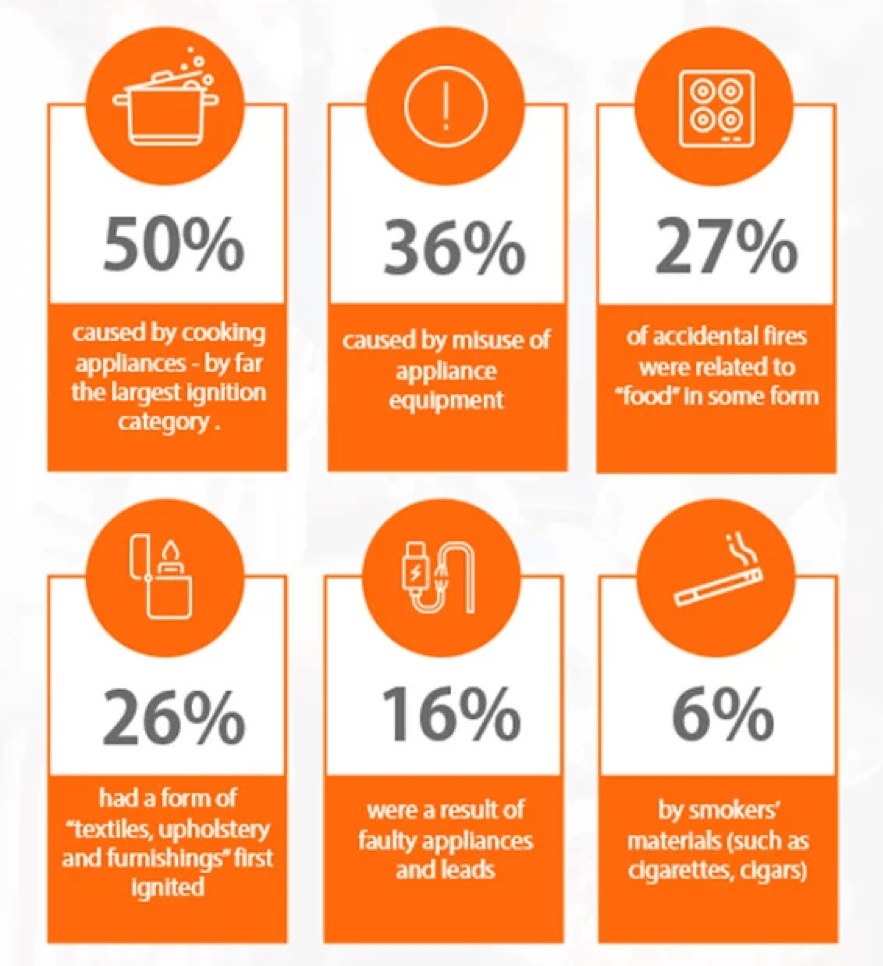Fire Safety
Fire Safety
Student accommodation can be at high risk of fire, with those living in rented or shared accommodation are seven times more likely to have a fire. But what can be done to protect yourself against the risks?
Did you know:
More than half of all fires are started in the kitchen, so it is vital that appropriate care is taken when cooking (especially if you have been drinking!).
Some of the most common sources of kitchen fire are from leaving cooking appliances on or unattended, or when oil ignites. For more information on how to stay safe in the kitchen, download this kitchen fire safety ebook.

Candles cause more than 5 fires a day.
Many new students will be sent off to university with candles and incense to make their halls more homely, but such items pose a significant fire risk. Candles themselves cause more than 5 fires every day.
Always remember to blow out candles and incense sticks before going to sleep or leaving the room. Ensure that they are situated away from flammable items such as clothing, bedding or curtains, and paperwork, or to fully remove the risk, try battery powered candles or reed diffusers.
Turn off any electrical items that you will not be using overnight. Fires can spread rapidly and can cause severe damage before being noticed, you can reduce the risk overnight by turning off any unused electrical appliances.
Overloading sockets is a big no go, never overload electrical sockets or electrical adaptors. Take particular caution with extension leads/adaptors and high powered items like kettles, heaters and irons to ensure they will not exceed the maximum current rating stated.
Make sure you know the limit and check you are not overloading your sockets by using the Socket Calculator below, brought to you by Electrical Safety First.
Cheshire Fire & Rescue Service advise: “An extension lead or adaptor will have a limit to how many amps it can take, so be careful not to overload them to reduce the risk of fire. Around 28,000 fires in the home are reported each year as being caused by electrical faults, accidents or misuse of electrical equipment.”
Check your electrical cables for any damage, wear and tear and the plug is secured to the cable. If a wire is frayed, damaged in any way or isn’t connected to the plug securely, do not use this electrical item.
Student housing providers have responsibilities to ensure that accommodation meets certain fire safety standards to protect tenants.
This includes:
Fines of up to £5,000, and in some cases a prison sentence, can be charged for providers who do not comply with legislation from the Housing Act and the Smoke and Carbon Monoxide Alarm Regulations 2015.
The most common items of fire safety equipment used in shared student accommodation are interlinking fire alarms, carbon monoxide alarms, and items such as fire extinguishers and fire blankets.
It is imperative that students check the safety equipment that has been provided to ensure that everything is in working order.
Never cover up smoke alarms or take out the batteries. Smoke alarms save lives – you are at least 8 times more likely to die in a fire without working smoke alarms.
Make sure that you are aware of fire escape routes in case of an emergency, and always remember to keep fire doors free from obstruction (and do not prop them open).